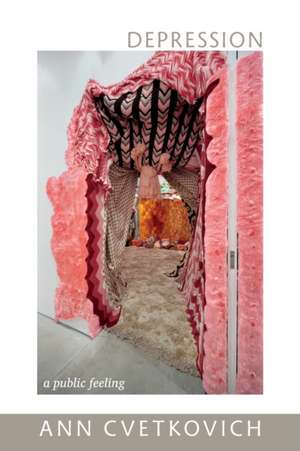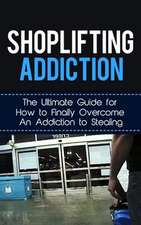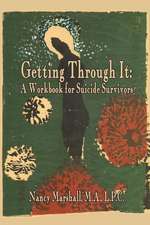Depression – A Public Feeling
Autor Ann Cvetkovichen Limba Engleză Paperback – 4 noi 2012
Preț: 160.42 lei
Nou
Puncte Express: 241
Preț estimativ în valută:
30.70€ • 32.05$ • 25.41£
30.70€ • 32.05$ • 25.41£
Carte disponibilă
Livrare economică 14-28 martie
Livrare express 28 februarie-06 martie pentru 28.35 lei
Preluare comenzi: 021 569.72.76
Specificații
ISBN-13: 9780822352389
ISBN-10: 0822352389
Pagini: 296
Ilustrații: 38 illustrations, including 14 in color
Dimensiuni: 154 x 232 x 20 mm
Greutate: 0.45 kg
Editura: MD – Duke University Press
ISBN-10: 0822352389
Pagini: 296
Ilustrații: 38 illustrations, including 14 in color
Dimensiuni: 154 x 232 x 20 mm
Greutate: 0.45 kg
Editura: MD – Duke University Press
Cuprins
Acknowledgments ix Introduction 1 Part I. The Depression Journals (A Memoir) Going Down 29 Swimming 43 The Return 62 Reflections: Memoir as Public Feelings Research Method 74 Part II. A Public Feelings Project (A Speculative Essay) 1. Writing Depression: Acedia, History, and Medical Models 85 2. From Dispossession to Radical Self-Possession: Racism and Depression 115 3. The Utopia of Ordinary Habit: Crafting, Creativity, and Spiritual Practice 154 Epilogue 203 Notes 213 Bibliography 243 Illustration Credits 265 Index 267
Recenzii
"Ann Cvetkovich is well known for her work on public feelings, and here she tackles depression as a public rather than a private feeling. Despite being suffered by many people (including academics), depression remains an affliction to be ashamed of, to disavow, to conceal. In the book, which is part personal memoir, part cultural critique, Cvetkovich discusses her own struggles with bipolar disorder (formerly known as manic depression). Using a range of approaches, she reads through her own depression in order to reach an understanding of something more social, institutional and political. She asks: what if capitalism makes us depressed? And what happens to those unproductive subjects whose refusal and passivity puts them outside a meaningful life?... Cvetkovich offers us an introduction to thinking critically about depression's causes and its manifestations as well as, perhaps, the localised tactics that are necessary to enable recovery. At the end, she turns rather sweetly to crafting as one reparative habit, partly because of the aesthetic of connectivity that it can stimulate. Knitting yourself out of depression: it's kind of folksy, but I liked it.--Sally R. Munt, Times Higher Education, November 8th 2012
"Combining cultural critique with nuanced readings of queer aesthetic practices, and mixing theoretical reflections on experience with experiments in memoir, Depression: A Public Feelings Project delivers not only critical insights but also wisdom. The book offers a model for something like collective or collaborative authorship; framed as a project conceived in concert with a far-flung community of academics, activists, and artists, Depression is a departure from academic business as usual. This is a profoundly inspiring book."--Heather Love, author of Feeling Backward: Loss and the Politics of Queer History
"A provocative addition to Ann Cvetkovich's eloquent writings on the archives of public feelings, this book takes depression out of the space of the private into the complex politics of our time. Weaving together memoir, cultural and medical history, and literary and theoretical discussion, Cvetkovich experiments with and reflects on unconventional ways of writing about embodiment, cognition, and affect. Along the way, she offers myriad prescriptions, small and large, on how to cope with the daily effects of depression and how to heal the world."--Marianne Hirsch, author of The Generation of Postmemory: Writing and Visual Culture after the Holocaust
"Like all my favorite bands, Ann Cvetkovich disregards trends in favor of fearlessness. While tackling the tough issues of today, she still gives us a book that feels totally timeless. Depression: A Public Feeling fills a gap that has morphed into a crater. The book is as invaluable as it is enjoyable. I found myself sighing throughout, thinking 'Phew, someone finally said that!'"--Kathleen Hanna, of the bands Le Tigre, Bikini Kill, and the Julie Ruin
"At one end, Depression is a call to expand how we frame and engage with depression, and at the other its an internal appeal to academia to accept personal experience as a valid source material for scholarship. By melding the personal and the academic, Cvetkovich is creating an important new forum for how we discuss depression. . . . The material is totally fascinating."--Nina Lary, Bitch
"A new book by Anne Cvetkovich, Depression: A Public Feeling sets out to challenge contemporary medical notions of depression that simultaneously relieve one of responsibility (its just genes or chemicals) and provide agency (you can fix it by taking a pill). Depression, she says, can be seen as a category that that manages and medicalises the feelings associated with keeping up with corporate culture and the market economy, or with being completely neglected by it. A section in which Cvetkovich describes her own depression is followed by chapter that focus on contemporary artists and also on a number of writers, each of whom suffered from depression and writers block. In anatomising her lived experience of writers block, Cvetkovich invites the reader to ask whether, despite the trade-specific terminology, this is still a symptom exclusive to writers [ ] Though Cvetkovichs prose can sag with a peculiarly American brand of preciousness and indiscriminate rapture, her perceptions are agile."--Talitha Stevenson, New Statesman, Nov 2012
"Cvetkovichs book emerges from the context of a new school of thought in the humanities called affect theory, in which emotionsor feelings, as Cvetkovich prefers to call themare the privileged means of exploring cultural artefacts.... While the theoretical language of affect theory may seem impenetrable to those without training, its emphasis on the autobiographical and the emotional allows Depression to have a humanity and an accessibility that much academic writing fails to render and achieve."--William Burton, Lambda Literary Review, February 10th 2013
"Depression is part of what has come to be called the affective turn in academia, one that holds that emotion is a legitimate area of scholarly concerna shift that originated largely in womens studies. "Even before I had access to an explicit feminism," Cvetkovich says, "I was curious about what feelings were and why they were considered so suspicious. Feminism helped equip me with a sense that it was possible and important to transgress scholarly norms.""--Kirkus Reviews, February 2013
"[Cvetkovich's] book is an experiment in connecting personal feelings with social conditions and critical analysis. She divides it into "The Depression Journals," an engaging memoir of her own lengthy depression 20 years ago as a young graduate student and beginning assistant professor, and three heavily theoretical critical essays: on historical models of melancholy and spiritual crisis, the relationship between depression and racism, and the uses of crafting and creative work, including "new forms of writing that are 'essays' in the literal sense of an experiment," as antidotes to despair."--Elaine Showalter, Chronicle of Higher Education, April 2013
"In her latest book, Depression: A Public Feeling. Ann Cvetkovich considers depression from cultural, historical, political and personal perspectives. She writes, Id like to write about depression in a way that simultaneously captures how it feels and provides an analysis of why and how its feelings are produced by social forces.... Although she is not the first to consider that institutionalized racism causes depression, Cvetkovichs take on academias ills is unique. She writes, My episodic narrative tells the story of how academia seemed to be killing me, a statement that seems very melodramatic But to feel that your work doesnt matter is to feel dead inside, a condition that is normalized for so many. Academia breeds particular forms of panic and anxiety leading to what gets called depression.""--Rachel Pepper, Curve, April 2013
"Ann Cvetkovich is well known for her work on public feelings, and here she tackles depression as a public rather than a private feeling. Despite being suffered by many people (including academics), depression remains an affliction to be ashamed of, to disavow, to conceal. In the book, which is part personal memoir, part cultural critique, Cvetkovich discusses her own struggles with bipolar disorder (formerly known as manic depression). Using a range of approaches, she reads through her own depression in order to reach an understanding of something more social, institutional and political. She asks: what if capitalism makes us depressed? And what happens to those unproductive subjects whose refusal and passivity puts them outside a meaningful life?... Cvetkovich offers us an introduction to thinking critically about depression's causes and its manifestations as well as, perhaps, the localised tactics that are necessary to enable recovery. At the end, she turns rather sweetly to crafting as one reparative habit, partly because of the aesthetic of connectivity that it can stimulate. Knitting yourself out of depression: it's kind of folksy, but I liked it."--Sally R. Munt, Times Higher Education, November 8th 2012 "Combining cultural critique with nuanced readings of queer aesthetic practices, and mixing theoretical reflections on experience with experiments in memoir, Depression: A Public Feelings Project delivers not only critical insights but also wisdom. The book offers a model for something like collective or collaborative authorship; framed as a project conceived in concert with a far-flung community of academics, activists, and artists, Depression is a departure from academic business as usual. This is a profoundly inspiring book."--Heather Love, author of Feeling Backward: Loss and the Politics of Queer History "A provocative addition to Ann Cvetkovich's eloquent writings on the archives of public feelings, this book takes depression out of the space of the private into the complex politics of our time. Weaving together memoir, cultural and medical history, and literary and theoretical discussion, Cvetkovich experiments with and reflects on unconventional ways of writing about embodiment, cognition, and affect. Along the way, she offers myriad prescriptions, small and large, on how to cope with the daily effects of depression and how to heal the world."--Marianne Hirsch, author of The Generation of Postmemory: Writing and Visual Culture after the Holocaust "Like all my favorite bands, Ann Cvetkovich disregards trends in favor of fearlessness. While tackling the tough issues of today, she still gives us a book that feels totally timeless. Depression: A Public Feeling fills a gap that has morphed into a crater. The book is as invaluable as it is enjoyable. I found myself sighing throughout, thinking 'Phew, someone finally said that!'"--Kathleen Hanna, of the bands Le Tigre, Bikini Kill, and the Julie Ruin "At one end, Depression is a call to expand how we frame and engage with depression, and at the other it's an internal appeal to academia to accept personal experience as a valid source material for scholarship. By melding the personal and the academic, Cvetkovich is creating an important new forum for how we discuss depression... The material is totally fascinating."--Nina Lary, Bitch "A new book by Anne Cvetkovich, Depression: A Public Feeling... sets out to challenge 'contemporary medical notions' of depression 'that simultaneously relieve one of responsibility (it's just genes or chemicals) and provide agency (you can fix it by taking a pill)'. Depression, she says, 'can be seen as a category that that manages and medicalises' the feelings associated with 'keeping up with corporate culture and the market economy, or with being completely neglected by it'. A section in which Cvetkovich describes her own depression is followed by chapter that focus on contemporary artists and also on a number of writers, each of whom suffered from depression and writer's block. In anatomising her 'lived experience' of writer's block, Cvetkovich invites the reader to ask whether, despite the trade-specific terminology, this is still a symptom exclusive to writers [...] Though Cvetkovich's prose can sag with a peculiarly American brand of preciousness and indiscriminate rapture, her perceptions are agile."--Talitha Stevenson, New Statesman, Nov 2012 "Cvetkovich's book emerges from the context of a new school of thought in the humanities called affect theory, in which emotions - or feelings, as Cvetkovich prefers to call them - are the privileged means of exploring cultural artefacts... While the theoretical language of affect theory may seem impenetrable to those without training, its emphasis on the autobiographical and the emotional allows Depression to have a humanity and an accessibility that much academic writing fails to render and achieve."--William Burton, Lambda Literary Review, February 10th 2013 "Depression is part of what has come to be called the "affective turn" in academia, one that holds that emotion is a legitimate area of scholarly concern-a shift that originated largely in women's studies. "Even before I had access to an explicit feminism," Cvetkovich says, "I was curious about what feelings were and why they were considered so suspicious. Feminism helped equip me with a sense that it was possible and important to transgress scholarly norms."--Kirkus Reviews, February 2013 "[Cvetkovich's] book is an experiment in connecting personal feelings with social conditions and critical analysis. She divides it into "The Depression Journals," an engaging memoir of her own lengthy depression 20 years ago as a young graduate student and beginning assistant professor, and three heavily theoretical critical essays: on historical models of melancholy and spiritual crisis, the relationship between depression and racism, and the uses of crafting and creative work, including "new forms of writing that are 'essays' in the literal sense of an experiment," as antidotes to despair."--Elaine Showalter, Chronicle of Higher Education, April 2013 "In her latest book, Depression: A Public Feeling. Ann Cvetkovich considers depression from cultural, historical, political and personal perspectives. She writes, "I'd like to write about depression in a way that simultaneously captures how it feels and provides an analysis of why and how its feelings are produced by social forces."... Although she is not the first to consider that institutionalized racism causes depression, Cvetkovich's take on academia's ills is unique. She writes, "My episodic narrative tells the story of how academia seemed to be killing me, a statement that seems very melodramatic...But to feel that your work doesn't matter is to feel dead inside, a condition that is normalized for so many. Academia breeds particular forms of panic and anxiety leading to what gets called depression."--Rachel Pepper, Curve, April 2013
"Combining cultural critique with nuanced readings of queer aesthetic practices, and mixing theoretical reflections on experience with experiments in memoir, Depression: A Public Feelings Project delivers not only critical insights but also wisdom. The book offers a model for something like collective or collaborative authorship; framed as a project conceived in concert with a far-flung community of academics, activists, and artists, Depression is a departure from academic business as usual. This is a profoundly inspiring book."--Heather Love, author of Feeling Backward: Loss and the Politics of Queer History
"A provocative addition to Ann Cvetkovich's eloquent writings on the archives of public feelings, this book takes depression out of the space of the private into the complex politics of our time. Weaving together memoir, cultural and medical history, and literary and theoretical discussion, Cvetkovich experiments with and reflects on unconventional ways of writing about embodiment, cognition, and affect. Along the way, she offers myriad prescriptions, small and large, on how to cope with the daily effects of depression and how to heal the world."--Marianne Hirsch, author of The Generation of Postmemory: Writing and Visual Culture after the Holocaust
"Like all my favorite bands, Ann Cvetkovich disregards trends in favor of fearlessness. While tackling the tough issues of today, she still gives us a book that feels totally timeless. Depression: A Public Feeling fills a gap that has morphed into a crater. The book is as invaluable as it is enjoyable. I found myself sighing throughout, thinking 'Phew, someone finally said that!'"--Kathleen Hanna, of the bands Le Tigre, Bikini Kill, and the Julie Ruin
"At one end, Depression is a call to expand how we frame and engage with depression, and at the other its an internal appeal to academia to accept personal experience as a valid source material for scholarship. By melding the personal and the academic, Cvetkovich is creating an important new forum for how we discuss depression. . . . The material is totally fascinating."--Nina Lary, Bitch
"A new book by Anne Cvetkovich, Depression: A Public Feeling sets out to challenge contemporary medical notions of depression that simultaneously relieve one of responsibility (its just genes or chemicals) and provide agency (you can fix it by taking a pill). Depression, she says, can be seen as a category that that manages and medicalises the feelings associated with keeping up with corporate culture and the market economy, or with being completely neglected by it. A section in which Cvetkovich describes her own depression is followed by chapter that focus on contemporary artists and also on a number of writers, each of whom suffered from depression and writers block. In anatomising her lived experience of writers block, Cvetkovich invites the reader to ask whether, despite the trade-specific terminology, this is still a symptom exclusive to writers [ ] Though Cvetkovichs prose can sag with a peculiarly American brand of preciousness and indiscriminate rapture, her perceptions are agile."--Talitha Stevenson, New Statesman, Nov 2012
"Cvetkovichs book emerges from the context of a new school of thought in the humanities called affect theory, in which emotionsor feelings, as Cvetkovich prefers to call themare the privileged means of exploring cultural artefacts.... While the theoretical language of affect theory may seem impenetrable to those without training, its emphasis on the autobiographical and the emotional allows Depression to have a humanity and an accessibility that much academic writing fails to render and achieve."--William Burton, Lambda Literary Review, February 10th 2013
"Depression is part of what has come to be called the affective turn in academia, one that holds that emotion is a legitimate area of scholarly concerna shift that originated largely in womens studies. "Even before I had access to an explicit feminism," Cvetkovich says, "I was curious about what feelings were and why they were considered so suspicious. Feminism helped equip me with a sense that it was possible and important to transgress scholarly norms.""--Kirkus Reviews, February 2013
"[Cvetkovich's] book is an experiment in connecting personal feelings with social conditions and critical analysis. She divides it into "The Depression Journals," an engaging memoir of her own lengthy depression 20 years ago as a young graduate student and beginning assistant professor, and three heavily theoretical critical essays: on historical models of melancholy and spiritual crisis, the relationship between depression and racism, and the uses of crafting and creative work, including "new forms of writing that are 'essays' in the literal sense of an experiment," as antidotes to despair."--Elaine Showalter, Chronicle of Higher Education, April 2013
"In her latest book, Depression: A Public Feeling. Ann Cvetkovich considers depression from cultural, historical, political and personal perspectives. She writes, Id like to write about depression in a way that simultaneously captures how it feels and provides an analysis of why and how its feelings are produced by social forces.... Although she is not the first to consider that institutionalized racism causes depression, Cvetkovichs take on academias ills is unique. She writes, My episodic narrative tells the story of how academia seemed to be killing me, a statement that seems very melodramatic But to feel that your work doesnt matter is to feel dead inside, a condition that is normalized for so many. Academia breeds particular forms of panic and anxiety leading to what gets called depression.""--Rachel Pepper, Curve, April 2013
"Ann Cvetkovich is well known for her work on public feelings, and here she tackles depression as a public rather than a private feeling. Despite being suffered by many people (including academics), depression remains an affliction to be ashamed of, to disavow, to conceal. In the book, which is part personal memoir, part cultural critique, Cvetkovich discusses her own struggles with bipolar disorder (formerly known as manic depression). Using a range of approaches, she reads through her own depression in order to reach an understanding of something more social, institutional and political. She asks: what if capitalism makes us depressed? And what happens to those unproductive subjects whose refusal and passivity puts them outside a meaningful life?... Cvetkovich offers us an introduction to thinking critically about depression's causes and its manifestations as well as, perhaps, the localised tactics that are necessary to enable recovery. At the end, she turns rather sweetly to crafting as one reparative habit, partly because of the aesthetic of connectivity that it can stimulate. Knitting yourself out of depression: it's kind of folksy, but I liked it."--Sally R. Munt, Times Higher Education, November 8th 2012 "Combining cultural critique with nuanced readings of queer aesthetic practices, and mixing theoretical reflections on experience with experiments in memoir, Depression: A Public Feelings Project delivers not only critical insights but also wisdom. The book offers a model for something like collective or collaborative authorship; framed as a project conceived in concert with a far-flung community of academics, activists, and artists, Depression is a departure from academic business as usual. This is a profoundly inspiring book."--Heather Love, author of Feeling Backward: Loss and the Politics of Queer History "A provocative addition to Ann Cvetkovich's eloquent writings on the archives of public feelings, this book takes depression out of the space of the private into the complex politics of our time. Weaving together memoir, cultural and medical history, and literary and theoretical discussion, Cvetkovich experiments with and reflects on unconventional ways of writing about embodiment, cognition, and affect. Along the way, she offers myriad prescriptions, small and large, on how to cope with the daily effects of depression and how to heal the world."--Marianne Hirsch, author of The Generation of Postmemory: Writing and Visual Culture after the Holocaust "Like all my favorite bands, Ann Cvetkovich disregards trends in favor of fearlessness. While tackling the tough issues of today, she still gives us a book that feels totally timeless. Depression: A Public Feeling fills a gap that has morphed into a crater. The book is as invaluable as it is enjoyable. I found myself sighing throughout, thinking 'Phew, someone finally said that!'"--Kathleen Hanna, of the bands Le Tigre, Bikini Kill, and the Julie Ruin "At one end, Depression is a call to expand how we frame and engage with depression, and at the other it's an internal appeal to academia to accept personal experience as a valid source material for scholarship. By melding the personal and the academic, Cvetkovich is creating an important new forum for how we discuss depression... The material is totally fascinating."--Nina Lary, Bitch "A new book by Anne Cvetkovich, Depression: A Public Feeling... sets out to challenge 'contemporary medical notions' of depression 'that simultaneously relieve one of responsibility (it's just genes or chemicals) and provide agency (you can fix it by taking a pill)'. Depression, she says, 'can be seen as a category that that manages and medicalises' the feelings associated with 'keeping up with corporate culture and the market economy, or with being completely neglected by it'. A section in which Cvetkovich describes her own depression is followed by chapter that focus on contemporary artists and also on a number of writers, each of whom suffered from depression and writer's block. In anatomising her 'lived experience' of writer's block, Cvetkovich invites the reader to ask whether, despite the trade-specific terminology, this is still a symptom exclusive to writers [...] Though Cvetkovich's prose can sag with a peculiarly American brand of preciousness and indiscriminate rapture, her perceptions are agile."--Talitha Stevenson, New Statesman, Nov 2012 "Cvetkovich's book emerges from the context of a new school of thought in the humanities called affect theory, in which emotions - or feelings, as Cvetkovich prefers to call them - are the privileged means of exploring cultural artefacts... While the theoretical language of affect theory may seem impenetrable to those without training, its emphasis on the autobiographical and the emotional allows Depression to have a humanity and an accessibility that much academic writing fails to render and achieve."--William Burton, Lambda Literary Review, February 10th 2013 "Depression is part of what has come to be called the "affective turn" in academia, one that holds that emotion is a legitimate area of scholarly concern-a shift that originated largely in women's studies. "Even before I had access to an explicit feminism," Cvetkovich says, "I was curious about what feelings were and why they were considered so suspicious. Feminism helped equip me with a sense that it was possible and important to transgress scholarly norms."--Kirkus Reviews, February 2013 "[Cvetkovich's] book is an experiment in connecting personal feelings with social conditions and critical analysis. She divides it into "The Depression Journals," an engaging memoir of her own lengthy depression 20 years ago as a young graduate student and beginning assistant professor, and three heavily theoretical critical essays: on historical models of melancholy and spiritual crisis, the relationship between depression and racism, and the uses of crafting and creative work, including "new forms of writing that are 'essays' in the literal sense of an experiment," as antidotes to despair."--Elaine Showalter, Chronicle of Higher Education, April 2013 "In her latest book, Depression: A Public Feeling. Ann Cvetkovich considers depression from cultural, historical, political and personal perspectives. She writes, "I'd like to write about depression in a way that simultaneously captures how it feels and provides an analysis of why and how its feelings are produced by social forces."... Although she is not the first to consider that institutionalized racism causes depression, Cvetkovich's take on academia's ills is unique. She writes, "My episodic narrative tells the story of how academia seemed to be killing me, a statement that seems very melodramatic...But to feel that your work doesn't matter is to feel dead inside, a condition that is normalized for so many. Academia breeds particular forms of panic and anxiety leading to what gets called depression."--Rachel Pepper, Curve, April 2013
Notă biografică
Descriere
Crafts a cultural analysis that can adequately represent depression not as medical pathology but as a historical category, a felt experience, and a point of entry onto discussions about theory and contemporary culture

























